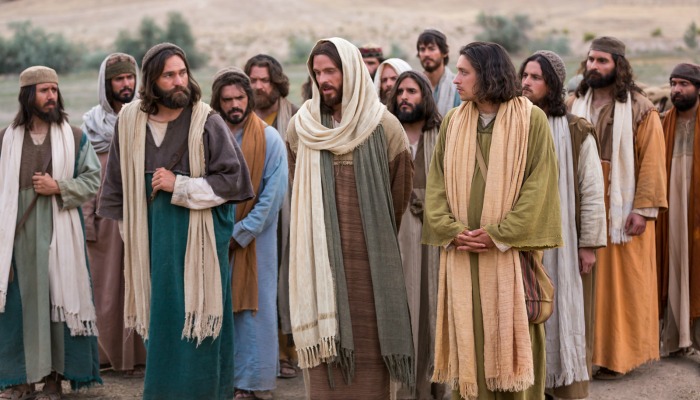
I truly believe that all of us, at some point or another, will struggle with our faith.
Whether it stems from Church history, a Church policy you don’t understand or agree with, or simply feeling like you never received that lightbulb moment you’ve longed for, each of us is going to be faced with questions and concerns.
Having questions or concerns or even doubts doesn’t make you unfaithful. It doesn’t mean that you’re doing something wrong, and it certainly doesn’t mean you should abandon everything you’ve loved and lived for because your testimony is struggling.
What it does mean is that you’ve reached the point in your life when your faith is really going to count. After all, what’s the purpose of faith if not to carry us through something we don’t understand?
One of my favorite quotes from Jane Eyre come’s from the novel’s heroine, Jane. When the man she loves tempts her to do something she feels is wrong, she replies:
“Laws and principles are not for the times when there is no temptation: they are for such moments as this . . . If at my individual convenience I might break them, what would be their worth?”
Anyone can have faith (or follow their morals, in Jane’s case) when it is easy — it’s when it’s hard that it matters most. What is faith’s worth if at the first sign of doubt, we abandon everything we have previously believed? Faith isn’t really faith if it’s never tested.
So if you feel like your testimony is struggling, don’t lose hope. Don’t abandon the faith you do have, no matter how small you might feel it is — and instead of asking, “What am I doing wrong?” or “Should I leave the Church?” ask yourself these questions.
1. Do I believe that the Book of Mormon is true?

If you can’t say that you currently believe it’s true or perhaps you’re unsure, think about a time when you DID have a testimony of its truthfulness. What did you do to gain that testimony — and are you repeating the same steps you took then?
However, if you feel like you’ve never had a testimony of the Book of Mormon, ask yourself how you can get one. Of course we know that we must ask God if it’s “not true,” but are you willing to act on the answer you do receive? Are you willing to give up “all [your] sins to know [God]“? If not, that’s okay — but don’t be surprised if you don’t receive an answer.
Also, an important note: don’t brush away spiritual experiences you’ve had. Laman and Lemuel brushed aside or explained away every angel they saw and every moment of clarity they had because without faith, even seeing isn’t enough. Don’t look back and think, “Oh, I thought I knew then, but did I really?” Try not to doubt yourself — instead, contemplate what is different about your life now than it was then. How can you recreate the experiences you once had?
2. Am I as actively searching for reasons the Church might be true as I am searching for reasons it’s not?
 Time and time again, I’ve seen people go down the rabbit hole of so-called Church history mistakes. They come across things — things that may or may not be true — that seem contrary to our beliefs. Then, they continue searching for things to further prove a conclusion that says the Church isn’t true.
Time and time again, I’ve seen people go down the rabbit hole of so-called Church history mistakes. They come across things — things that may or may not be true — that seem contrary to our beliefs. Then, they continue searching for things to further prove a conclusion that says the Church isn’t true.
But are we as actively searching for reasons the Church is true as we are searching for reasons it isn’t? Do we put the same time in energy in trying to prove that it could be true that we do in trying to prove that it is untrue? I personally believe that if we are earnestly trying to find out if it’s true, we’ll see that the doctrine, miracles, and goodness of the gospel completely outweigh anything we might see as negativities.
3. Am I doing His will? Following His commandments?
 In John 7:17, Christ promises the Jews, “If any man will do his will, he shall know of the doctrine, whether it be of God, or whether I speak of myself.” Translation: if you’ll actually follow through on the things He’s asking you to do, you’ll be able to tell whether what He’s saying is true or a lie.
In John 7:17, Christ promises the Jews, “If any man will do his will, he shall know of the doctrine, whether it be of God, or whether I speak of myself.” Translation: if you’ll actually follow through on the things He’s asking you to do, you’ll be able to tell whether what He’s saying is true or a lie.
Demanding an answer without doing what God has asked is kind of like wanting to lose weight but being unwilling to change your lifestyle. If you want to lose weight, you know that you need to follow certain principles — you need to exercise, cut calories, and be consistent. If you want to know that the gospel is true, you need to follow certain principles, too, in the form of God’s commandments.
Only then will you achieve the desired result: an answer.
4. Do I want it to be true?
 Do I want this Church to be true? Do I want to accept all of the responsibilities and commandments associated with this faith? Or is there something inharmonious about my life that is leading me to look for reasons it isn’t true?
Do I want this Church to be true? Do I want to accept all of the responsibilities and commandments associated with this faith? Or is there something inharmonious about my life that is leading me to look for reasons it isn’t true?
Have you ever dated someone that wasn’t right for you, but that you really cared about? I have. I’ve had relationships where despite what my gut said and what the people around me said, I persuaded myself that it could work and looked for the reasons it would be a good match. I ignored the bad (the times I was treated poorly) and focused on the good (the less frequent times when I was treated well).
I think that sometimes, we do the same thing with the Church. For example, say someone investigating the Church really likes to drink alcohol and they really don’t want to give that up. That’s natural and it doesn’t make them a bad or unfaithful person! But in their desire to not give that practice up, they search for reasons the Church isn’t true so that they won’t have to let go of that beloved habit. Because they’re avidly looking for reasons it isn’t true, they’re missing all of the reasons that says it IS true. Basically, they don’t want it to be true, so they find reasons it isn’t.
I realize that people may say that the opposite is true as well — if we want it to be true, we’ll find reasons it is and completely ignore all of the signs that say it isn’t. To that, all I can say is that you know what? Maybe you’re right. But at the end of the day, I don’t think something not true could make me feel the way I do when I hear certain doctrines. I don’t think a Spirit that isn’t there could warn me of danger or give me feelings of peace and comfort when I’m deeply discouraged.
Truly, I believe that any person who is searching for truth and is unbiased will find that if they follow God’s commandments, as question three reminds us, they’ll find the truth.
5. Does the good outweigh the bad?

Question #2 covers this one briefly, but I think it’s important to go into more depth. Do the positive aspects of the gospel outweigh the ones you struggle with? Is there more good than bad within the Church?
The gospel’s emphasis on kindness, love, and peace — do those come from a bad place? Its focus on Christ and following His teachings — is that just a tactic for creating blind obedience?
I don’t think so. In the gospel, there are things we don’t know; things we may not understand now or maybe ever in this life. But as Elder Jeffrey R. Holland so movingly said:
“Brothers and sisters, this is a divine work in process, with the manifestations and blessings of it abounding in every direction, so please don’t hyperventilate if from time to time issues arise that need to be examined, understood, and resolved. They do and they will. In this Church, what we know will always trump what we do not know. And remember, in this world, everyone is to walk by faith.
So be kind regarding human frailty—your own as well as that of those who serve with you in a Church led by volunteer, mortal men and women. Except in the case of His only perfect Begotten Son, imperfect people are all God has ever had to work with. That must be terribly frustrating to Him, but He deals with it. So should we. And when you see imperfection, remember that the limitation is not in the divinity of the work. As one gifted writer has suggested, when the infinite fulness is poured forth, it is not the oil’s fault if there is some loss because finite vessels can’t quite contain it all. Those finite vessels include you and me, so be patient and kind and forgiving.” (emphasis added)
Having questions is okay. Struggling is okay. But before you cast aside your faith, ask yourself these five questions and be honest in your answers.
With all of my heart, I believe that The Church of Jesus Christ of Latter-day Saints is Christ’s restored church on the earth today. That belief has carried me through times of grief and sadness, feelings of helplessness and hopelessness, moments of concern and worry, and everything in between. It has made my life so much better and I hope that as you strive to regain or strengthen your testimony, you’ll find that faith makes your life better, too.





